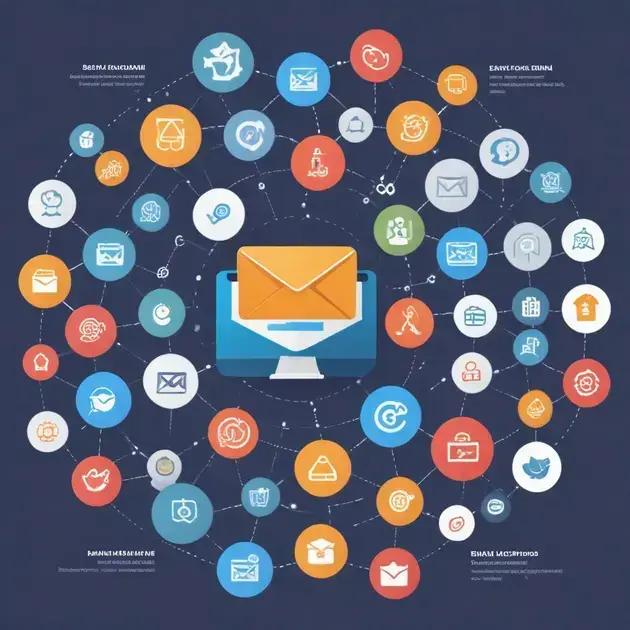Enterprise email marketing platforms are essential tools for businesses aiming to efficiently manage large-scale email campaigns. They offer features like automation, segmentation, and analytics to enhance engagement and drive results, making them valuable for connecting with customers effectively.
Enterprise email marketing platforms are essential tools for businesses looking to optimize their communication strategies. These platforms simplify the process of reaching out to customers and prospects, ensuring effective and targeted messaging. This article delves into the various features, benefits, and best practices for selecting the right email marketing platform for your enterprise.
Understanding Enterprise Email Marketing
Understanding Enterprise Email Marketing is crucial for companies looking to enhance their communication and marketing strategies. It involves using specialized platforms that allow large organizations to manage their email communications effectively. These platforms provide tools to design, send, and analyze marketing campaigns, which significantly improves customer engagement.
What is Enterprise Email Marketing?
Enterprise email marketing refers to the practice of sending bulk communications targeted at existing and potential customers within a large organization. It differs from standard email marketing due to its scalability and sophisticated features that accommodate the needs of larger audiences.
Benefits of Using Email Marketing Platforms
The advantages of using dedicated email marketing platforms for enterprises include enhanced analytics capabilities, automation features, and efficient list management. These tools help organizations track user engagement, segment their audience effectively, and automate repetitive tasks, leading to cost and time savings.
Components of Successful Email Marketing
Successful email marketing combines compelling content, strategic design, and proper audience targeting. Enterprise email platforms often provide templates, A/B testing options, and personalization features to help businesses craft emails that resonate with their audience.
Understanding Compliance and Regulations
When conducting email marketing, enterprises must adhere to regulations such as the CAN-SPAM Act in the U.S. and GDPR in Europe. Respecting opt-in permissions, providing easy unsubscribe options, and protecting user data are essential for maintaining compliance and building trust.
Key Features of Top Email Marketing Platforms

Key Features of Top Email Marketing Platforms play a significant role in determining how effectively companies can reach their audience. Understanding these features helps businesses choose the right platform for their needs.
Automation Capabilities
Automation is a vital feature that allows organizations to set up email sequences based on user behaviors. This could include welcome emails, reminders, or even re-engagement campaigns, which save time and ensure timely communication with customers.
Segmentation and Targeting
Effective segmentation enables marketers to divide their email lists into smaller groups based on specific criteria, such as demographics or past behaviors. This leads to more personalized messaging and higher engagement rates, improving the overall effectiveness of email campaigns.
Analytics and Reporting
Top email marketing platforms provide robust analytics tools that track metrics such as open rates, click-through rates, and conversion rates. These insights are crucial for understanding campaign performance and making data-driven improvements.
Template Designs
A user-friendly design interface with customizable templates allows marketers to create visually appealing emails without requiring advanced design skills. Many platforms offer pre-built templates that are mobile-responsive and optimized for different devices.
A/B Testing Functionality
A/B testing helps marketers compare two different email versions to see which performs better. This feature allows businesses to test subject lines, content, and designs, helping them optimize future campaigns based on real data.
How to Choose the Right Platform
How to Choose the Right Platform is essential for organizations looking to maximize their email marketing efforts. With many options available, it’s important to assess your specific needs before making a decision.
Identify Your Business Goals
Start by defining your email marketing objectives. Are you looking to drive sales, increase brand awareness, or improve customer engagement? Understanding your goals helps narrow down the features you need in a platform.
Evaluate Features and Functionality
Different platforms offer various features, such as automation, reporting, and integrations with other tools. Make a list of the features that are most important to you and compare different platforms to find one that meets your requirements.
Consider Budget and Pricing
Budget is an important factor when selecting an email marketing platform. Review the pricing structures of different providers and assess whether their offerings align with your budget while still meeting your needs.
Look for User Reviews and Testimonials
Reading user reviews can provide valuable insights into a platform’s performance and customer support. Look for testimonials from businesses similar to yours to understand their experiences and the overall satisfaction with the platform.
Take Advantage of Free Trials
Many email marketing platforms offer free trials, allowing you to test their features before committing. Use these trials to assess the user interface, ease of use, and whether the platform meets your expectations.
Success Stories with Email Marketing

Success Stories with Email Marketing showcase how businesses can leverage effective email strategies to achieve impressive results. Various organizations across different sectors have demonstrated the power of email marketing in driving engagement and sales.
Case Study: E-commerce Brand
An e-commerce company implemented a targeted email campaign focusing on abandoned cart reminders. By sending personalized follow-up emails, they increased their recovery rate by 25%. This strategy not only brought customers back but also boosted overall sales.
Case Study: Non-Profit Organization
A non-profit organization used email marketing to raise awareness for an upcoming charitable event. By segmenting their audience based on previous involvement, they crafted tailored messages that encouraged higher attendance and donations. Their campaign led to a 40% increase in event participation compared to the previous year.
Case Study: Restaurant Chain
A restaurant chain utilized email marketing to promote its loyalty program. They sent out monthly newsletters featuring exclusive offers and updates. As a result, they saw a significant boost in loyalty sign-ups, increasing customer retention by 30% within six months.
Case Study: SaaS Company
A Software as a Service (SaaS) company employed an email drip campaign for onboarding new customers. The series of educational emails guided users through the platform’s features, reducing churn by 15% and enhancing customer satisfaction.
Lessons Learned
These success stories highlight the importance of personalization, segmentation, and strategic targeting. By understanding their audiences and crafting messages that resonate, these businesses exemplified how impactful email marketing can be in achieving growth and maintaining customer relationships.
Best Practices for Effective Email Campaigns
Best Practices for Effective Email Campaigns are essential for maximizing engagement and achieving your marketing goals. By following these guidelines, organizations can create successful campaigns that resonate with their audience.
1. Build a Quality Email List
Start with a clean and targeted email list. Focus on building your audience organically by using sign-up forms on your website and social media. Avoid purchasing email lists, as this can lead to high bounce rates and spam complaints.
2. Personalize Your Emails
Personalization goes beyond using the recipient’s name. Tailor content based on customer preferences, behaviors, and demographics. Personalized emails can drive higher open and click-through rates, making your campaigns more effective.
3. Craft Compelling Subject Lines
Your subject line is the first thing recipients see. Make it engaging and relevant to encourage opens. Using action-oriented language or asking questions can spark curiosity.
4. Optimize for Mobile Devices
Many people check emails on their mobile devices. Ensure your emails are mobile-friendly by using responsive design. Keep content concise and make buttons easy to click to improve user experience on smaller screens.
5. Test and Analyze
Continuously test different aspects of your campaigns, such as subject lines, content, and send times. Use A/B testing to see what works best for your audience. Analyze the results and adjust your strategies accordingly to enhance future campaigns.
6. Include Clear Calls to Action
Every email should have a clear and concise call to action (CTA). Whether it’s to shop now, visit a blog post, or participate in a survey, make sure your CTA stands out and guides the recipient on what to do next.
7. Monitor and Maintain Engagement
Consistently monitor engagement rates. If you notice a decline, consider re-engaging strategies like win-back campaigns. Regularly clean your list to remove inactive subscribers, helping maintain high engagement and delivery rates.
Wrap-Up: Leveraging Email Marketing for Success
Email marketing is a powerful tool that can transform how businesses connect with customers. By understanding key features, best practices, and learning from success stories, companies can build effective email campaigns that engage and convert.
A targeted approach, personalized content, and regular analysis can significantly increase email marketing success. By implementing these strategies, businesses can foster stronger relationships with their audience and drive growth.
Embrace the potential of email marketing to take your campaigns to the next level and achieve your business goals.
FAQ – Frequently Asked Questions about Enterprise Email Marketing Platforms
What is enterprise email marketing?
Enterprise email marketing refers to the use of specialized platforms to manage large-scale email campaigns targeted at existing and potential customers.
How can I build an effective email list?
You can build an effective email list by using sign-up forms on your website, engaging in social media campaigns, and ensuring you only collect emails from interested users.
What are some critical features to look for in an email marketing platform?
Key features to look for include automation capabilities, analytics and reporting, mobile optimization, and user-friendly design templates.
Why is personalization important in email marketing?
Personalization makes emails more relevant to the recipient, increasing engagement and improving open and click-through rates.
How often should I send marketing emails?
The frequency of emails depends on your audience and content, but a good practice is to send them regularly without overwhelming your subscribers.
What are some common mistakes to avoid in email marketing campaigns?
Common mistakes include not segmenting your audience, failing to personalize content, and ignoring mobile optimization.




